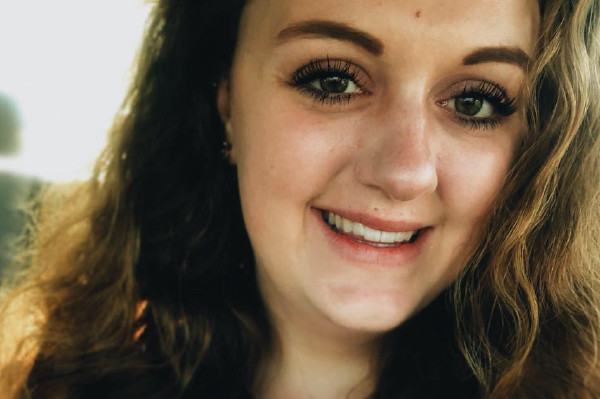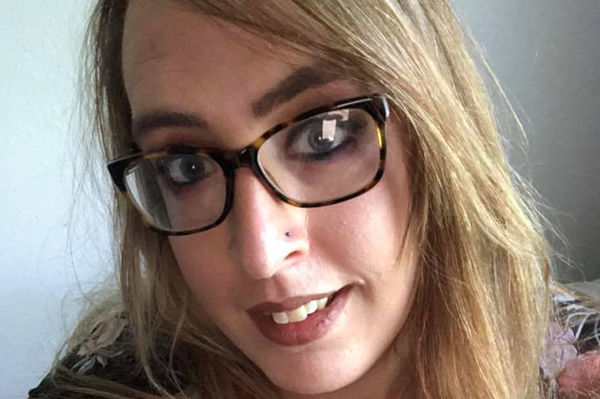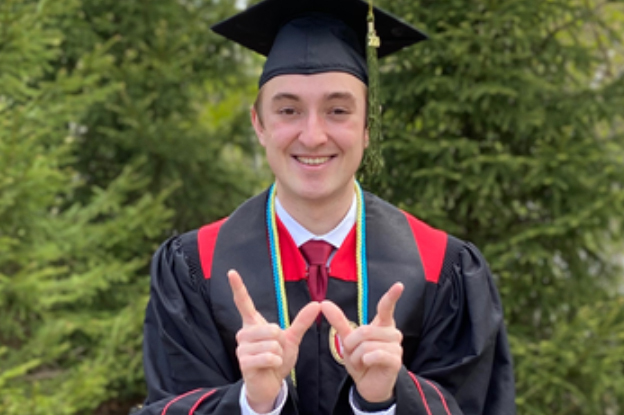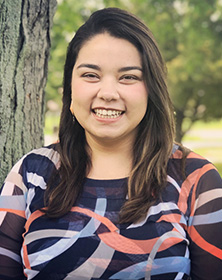In the Spring of 2020, the COVID-19 pandemic disrupted the lives of college students around the world with classes moving online, internships rescinded, and graduation ceremonies cancelled. These developments have affected the career plans and aspirations of a generation of college students. CCWT launched this oral history project to document and amplify student voices and experiences during the pandemic.
Many students who pursue higher education expect college to serve as a stepping stone for their future career paths. Between coursework, part time positions, and internships, students assume they are checking the boxes necessary for entry into the workforce. What college students could not have anticipated this year was a pandemic resulting, not only in the halting of in-person classes, but also a global recession with long-term implications on the job market. Students trying to navigate the traditional college experience have found the path to be all but traditional as they struggle to locate paid work, internships, or full-time post-graduation positions. In other cases, less class time for some students has meant more time devoted to work opportunities with potential upward mobility. Despite these disparate experiences, students in colleges across the country are thinking about the impacts of the pandemic on their career prospects. Many entered college in order to gain access to certain positions, but may leave their universities wondering whether or not those jobs will be available come graduation.
UW-Madison graduate students Alexandra Pasqualone and Mary Dueñas and other researchers at CCWT conducted and edited student interviews, which demonstrate the challenges of building a career and searching for work during the onset of the pandemic. The narrative below highlights the ups and downs of finding, keeping, and building professional experiences that may provide solid career paths for new graduates.

“I am actually working a lot more because I’m in school a lot less.”
Shayla Mentner’s entered college because of her passion for music. Noting her enthusiasm for her major, she states, “I just really felt like I wanted to combine my love of music with my love for connecting and interacting with people and interacting with people… I knew it had to be music because I’ve just loved it for as long as I can remember…. I’ve just grown up around music.”
Internship experiences are not new to Shayla as she spent her sophomore summer interning at the PR department for Ashley Furniture. As their intern, she helped plan a music festival.
Shayla: I got a sense of what it’s like to work in public relations which is something I am really glad I got to do. I got a taste of that type of work, and I really liked it. So, that kind of directly related to all of my school experience. I’m really glad I stumbled upon that opportunity.
The previous summer she worked for a country music festival in Eau Claire—a position which allowed her to participate in “more hands-on stuff, including some PR stuff.” Addressing these experiences, Shayla recalls:
Shayla: My two internships were very different experiences, but they are both experiences that I really enjoyed and that really related to most of my music business classes. I really felt like they directly contributed to my degree.
Although some students have lost their jobs or have struggled to find and maintain employment, others such as Shayla have found themselves working additional hours following the onset of the pandemic. This is partially due to an increase in free time as well as higher demands for essential workers in certain fields. In some cases, these work experiences have little to do with the actual career goals of these students. This is true for Shayla.
Shayla: I am actually working a lot more because I am in school a lot less. All my classes have stopped doing regular meetings, so basically I can do my schoolwork whenever I want now. Also, I am working a lot more because I work in healthcare now. I am not considering going into healthcare full-time. It is just a temporary job until I move back to Eau Claire. But since I do work in healthcare, there has been an increased need for us.
Additional hours on the job—placing her directly on the front linee—resulted from an experience shared by many in 2020. Shayla fell victim to the ramifications of the pandemic on employment. The shutdown of schools resulted in Shayla losing positions she acquired through the university, requiring her to look elsewhere for employment.
Shayla: I am working a lot more also because I lost half of my income which came from a few jobs through the university. I also made a lot of money playing piano for a few churches and a bunch of people privately at school. Now, they do not need me because they do not take lessons anymore. So, all of that income is gone too. Therefore, I have been trying to work more to supplement that. My income situation is screwed up, and I am just spending a lot more time at home trying not to go to the store unless I need to.
While Shayla was successful in finding work to supplement this dip in her income, other students in similar positions have not been so lucky.

“I’m applying to any position that I qualify for.”
Sara Martin is one student who has found it challenging to find employment. Sara graduated from the University of Wisconsin-Oshkosh with a double major in Supply Chain Management & Information Systems and is a currently in the data science master’s program. She notes that her lack of work experience combined with the restrictions of the coronavirus have made the job search more difficult than in previous years.
Over the past year, in addition to full-time schooling, Sara interned as a software engineer for the company Reveture as part of a three-month training program. Following her training, she landed a position in a software development role at JP Morgan Chase. Despite these and other internships, Sara, like many, has found herself looking for a new job in the middle of high unemployment rates. While sticking to her field of expertise, Sara has taken to professional online platforms to help her in her search. She notes:
Sara: I am seeking employment. Right now, I am pretty much looking anywhere all over the country. I am going on my LinkedIn account and trying to network and figure out who is hiring. I am applying to any position that I qualify for. I am primarily keeping it to software engineering roles, because that is what I like doing. I want to be doing work in that field. I’m looking for remote work; and trying to figure out the best place to go.
Despite the efforts, her lack of experience has resulted in little luck finding work opportunities for junior-level positions. Companies in her field not only want more experienced workers but have also curbed hiring new employees as a result of the pandemic” or “as a result of the economic impacts of the pandemic.
Sara: A lot of software engineering roles want five years of experience and I only have a year or so. So, I am trying to get into one of the junior roles but with all the COVID-19 stuff happening right now, a lot of companies that I have talked to have stopped searching for people…I have just been waiting around for companies to get back to me on the hiring process again.
Hiring freezes, as Sara notes, are linked to the current economic recession, as well as hurdles for in-person onboarding. It is impossible to say, when hiring rates will increase again. This is is something reflected in Sara’s experience on the job hunt and throughout the hiring process.
Sara: I have had a couple interviews that I had lined up. But then they decided to stop the process because they are concerned about the economy. So, it is definitely a challenge in that regard. Because companies are very wary, they do not want to just start bringing on people for no reason. And having a background in software engineering, sometimes it is hard to put someone into a remote position that is not fully developed compared to someone who has experience and can just hit the floor running.
Sarah acknowledges the stress many students face during this time:
Sara: It is just hard to find a job right now because everyone’s looking for a job. So, I am stressed out because you still have bills to pay. It is out of your hands. There is really nothing you can do because companies do not want to do anything at the moment. I am hoping that it does not last too long, but it seems like it is going to go a little longer.
In the meantime, Sara keeps busy by attending to her studies and practicing coding. She also makes sure to spend time doing things she enjoys, including playing video games, spending time with her fiancé, working out, and catching-up with friends. Like for others, however, the job search is very much on her mind as she continues to apply for positions.
Click here to learn more about Sara’s story, including details about her internship.

“I am a collaborative learner and collaborative worker so participating in this virtual job is weird.”
Even students interested in continuing their education after graduation have felt the impacts of the pandemic on their careers. Like Shayla, Christopher Gitter lost out on crucial aspects of his in-person summer internship due to the onset of the pandemic and the switch to remote learning and working experiences.
Christopher, a leukemia survivor involved in charity events at UW-Madison, was finishing his degree in Pharmacology and Toxicology, as well as certificates in Global Health and Environmental Studies at the start of the semester.
At the time of the interview, Christopher had submitted applications to medical school, but chose to take a gap year to continue clinical cardiology research with the Minneapolis Heart Institute Foundation. He notes that COVID affected his summer plans by moving his hands-on internship experience to a virtual platform.
Christopher: I was going to lead an in-person internship this summer for nine incoming interns, coordinate shadow experiences, and practice a lot of team development skills. Unfortunately, it is not happening anymore. It is all virtual. I personally thrive when I am with other people. I am a collaborative learner and collaborative worker so participating in this virtual job is weird. Thankfully, I had negotiated my full-time offer with my internship before COVID started so my job has not changed, but there is still always that uncertainty.
Having participated in the in-person version of his internship last summer, Christopher notes the various challenges of working virtually. These include ensuring access via online platforms is IRB and HIPPAA compliant. He also mentions additional challenges of working online, including the lack of significant observation hours and physician lectures and overall technical issues. In addition to the hurdles he anticipates in his own internship, Christopher talks broadly about the internship experiences of other students.
Christopher: In terms of internships, it basically killed them. I am a senior, so I mostly know seniors who are graduating with jobs. But I also know many more people who had internships cancelled, including internships that we had to cancel personally. I also know peoples’ internships who have continued. Even those that are going forward are doing so at a much smaller capacity and are honestly not as valuable as an in-person internship like the internship that we are doing. You do not get the experience of shadowing others and it is impersonal not being in the foundation building.
Luckily for Christopher, his plans to apply for medical school were unphased by the pandemic as he was able to take his MCAT mid-March before testing was cancelled. In terms of his career and plans for medical school, Christopher does note the significant change in the application process.
Christopher: Things, such as getting letters of recommendation, have been less personal. I was planning on grabbing a cup of coffee or even siting in the letter writer’s office and just chatting about life with them at the end of my senior year here. I have not been able to do that. Thankfully, it has not changed all that much for me.
Like Sara who is continuing her education and building her coding skills, Christopher is also laying the groundwork for his future in the medical field by working on his medical school application. It is clear that despite the challenges of developing professional skills during a pandemic, many students manage to continue making strides toward their career goals.

“I was panicking for a while because I thought I would be spending a year making minimum wage. After you finish college, you want to find a job.”
Out of all the transitions she had to endure during the 2020 Spring Semester, Christine Gan claims it was her internship that was most impacted by the pandemic. Like Christopher’s medical internship, Christine had to switch to an online format, a process which she says was difficult. Additionally, as for others, the pandemic had a significant impact on her current and future employment prospects.
Christine is a class of 2020 graduate with a bachelor’s degree in Psychology. She discusses the difficulty of switching to online classes and the disappointment of missing out on her graduation ceremony. Yet, during her interview with CCWT, Christine especially focuses on the challenges of virtually interning for Literacy Network where she oversaw eight adult learners and eight tutors.
Christine: I think my internship during the semester was impacted the most. I ended up having to teach students online. It is more difficult because of the language barrier and the challenge of getting information to them in an effective manner. It was difficult.
In addition to dealing with language barriers, Christine was also forced to transition from self-made lesson plans to structured assignments. Furthermore, teaching over the phone also posed challenges as it led to problems with miscommunication and comprehension issues due to the inability to work in-person with students. Overall, Christine felt that this transition to distance learning “was do-able, but not as effective.”
In addition to these challenges, a supervisor’s fear of infection forced Christine out of her job and left her without income for a month:the pandemic and fears of infection forced her out of a job and out of an income for a month following her return from spring break.
Christine: For my work, I left Madison for spring break. I went back to my hometown and when I came back, I did not have a job for about a month because my boss wanted to make sure I did not have any symptoms. I did not have income, which was difficult, but I have a steady income now, which I am extremely lucky to have.
Despite these challenges, Christine has pushed forward on the job search. Ultimately, she made the decision to look abroad for a position. Luckily, she found one as an English teacher. Discussing this decision, she recalls friends who have struggled to find and maintain internships and positions.
Christine: I ended up looking abroad because I felt like for a year or two, the job market is going to be shaky and unstable. I know a lot of my friends who graduated and their internships and jobs were put on hold or even canceled. They do not know what they are going to do, which is sad. You put in so much effort and end up not being able to find a job. I thought, ”If I can’t find a job in America, I’m going to look abroad and see what I can find.” [laughs] I ended up applying abroad.
Searching for a position, however, was not without its challenges. In the interview, Christine notes her struggles trying find a job as well as the fears of earning an adequate income.
Christine: Before, I was applying to a research position here in Madison. Due to the pandemic, that position was canceled. I was panicking for a while because I thought I would be spending a year making minimum wage. After you finish college, you want to find a job. After looking around, I finally found a job with decent pay. The only difference is that when I arrive in that country, I must be quarantined for 15 days before I can start the training process.
Like others, Christine experienced the ups and downs of finding and maintaining professional opportunities and income during a time when many companies are forced to move to online platforms or even cancel these opportunities.
There is a sense of frustration expressed by these students at the fact that many have entered colleges only to find themselves struggling to obtain employment upon graduating. Students, as demonstrated in these interviews, have had to endure a plethora of hurdles related to finding, acquiring, and keeping positions, all while trying to navigate the move to online platforms. As these students attempt to build much needed skills for the workplace amidst a global recession, they may discover that many of the positions they are hoping to enter are no longer available or have transformed and are requiring new skills due to the current circumstances.
Staff
 Mary Dueñas is a doctoral student in the Department of Educational Leadership & Policy Analysis and is a Project Assistant for the Center of Research on College-Workforce Transitions at the University of Wisconsin-Madison. Mary is originally from Pasadena, California, graduated from the University of California, Irvine and has a Master’s in Science in Counseling from UW-Madison. Before joining the team, Mary worked for the Posse Program, the Chic@ Latin@ Studies Program, the Summer Education Research Program, served as director for iD Tech, and is an instructor at UW-Madison. Mary’s research examines the experiences of underrepresented students of color in higher education. Central to her work are the concepts of belonging, mattering, cultural-orientation, motivation, academic success, and persistence within the university setting.
Mary Dueñas is a doctoral student in the Department of Educational Leadership & Policy Analysis and is a Project Assistant for the Center of Research on College-Workforce Transitions at the University of Wisconsin-Madison. Mary is originally from Pasadena, California, graduated from the University of California, Irvine and has a Master’s in Science in Counseling from UW-Madison. Before joining the team, Mary worked for the Posse Program, the Chic@ Latin@ Studies Program, the Summer Education Research Program, served as director for iD Tech, and is an instructor at UW-Madison. Mary’s research examines the experiences of underrepresented students of color in higher education. Central to her work are the concepts of belonging, mattering, cultural-orientation, motivation, academic success, and persistence within the university setting.
 Alexandra Pasqualone is a second-year student in a Joint PhD in Educational Policy Studies (EPS) and History. She has spent several years teaching in various capacities, including positions as a high school teacher in NJ, an English teacher at Akdeniz University in Turkey, and a Career Access and College Readiness Coordinator in Philadelphia. She is broadly interested in the historical role of youths as major activists who spurred changes within their communities. As part of her MA thesis at the University of Cincinnati, Alexandra conducted an oral history project attending to the protests of high school students in Philadelphia during the late 1960s and 1970s. Her current research centers around the implications of schools on Arab-American identity formation during the mid-twentieth century.
Alexandra Pasqualone is a second-year student in a Joint PhD in Educational Policy Studies (EPS) and History. She has spent several years teaching in various capacities, including positions as a high school teacher in NJ, an English teacher at Akdeniz University in Turkey, and a Career Access and College Readiness Coordinator in Philadelphia. She is broadly interested in the historical role of youths as major activists who spurred changes within their communities. As part of her MA thesis at the University of Cincinnati, Alexandra conducted an oral history project attending to the protests of high school students in Philadelphia during the late 1960s and 1970s. Her current research centers around the implications of schools on Arab-American identity formation during the mid-twentieth century.
